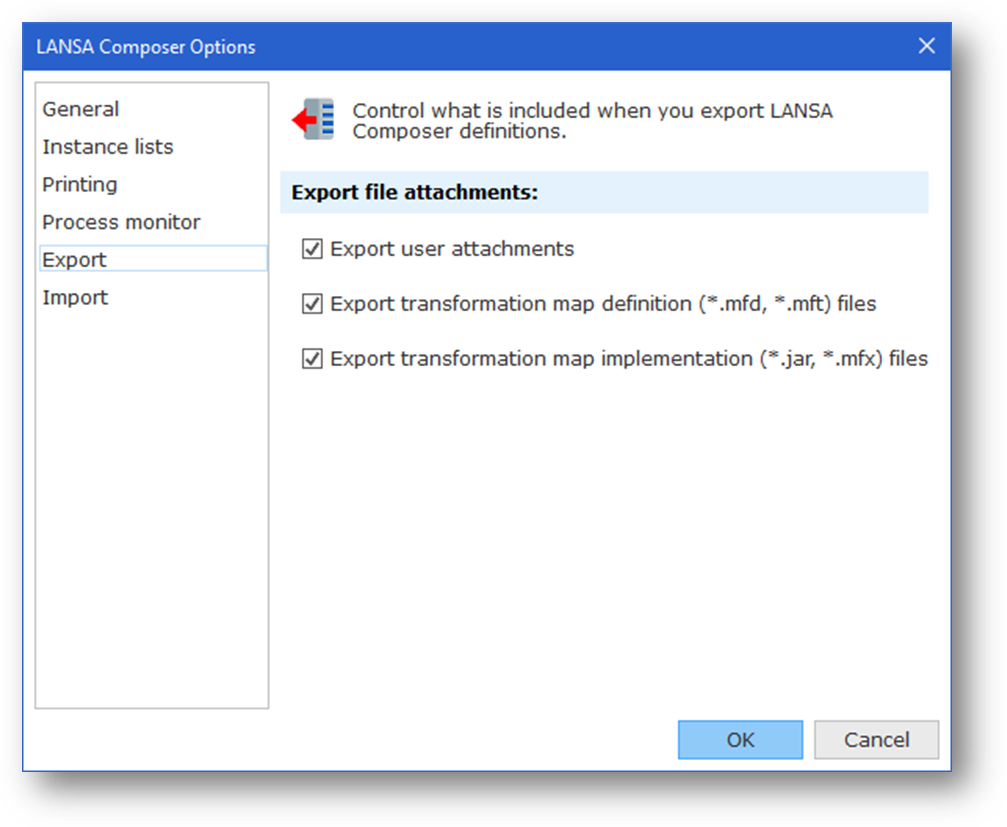 Version 7.0
Version 7.0
You can display the Export and Import Options by clicking the Options button either while working with an Export List or while creating an impromptu export.
The Export and Import options affect what is included when you export or import items.

Import/Export user attachments <what are user attachments???
This option controls whether user attachments to items in the import or export are included. If you do not include the user attachments, then they will not be exported/imported.
In most cases this option should be selected. However, user attachments can considerably increase the size of the data and the time required to export and import the items. For more information about user attachments, refer to the discussion of attachments in Working with Definition Items.
Import/Export transformation map definition (*.mfd, *.mft) files
The Transformation Map definition files are the .mfd files that contain the mapping definitions of your Transformation Maps. This option controls whether they are included in the import/export data when importing or exporting Transformation Maps.
Without the map definition files you will be unable to open the Transformation Maps in the mapping tool for review or edit. Nor will you be able to Prepare the Transformation Maps. The Transformation Map definitions (.mfd files) are not required at run-time and you may choose not to deploy them to a production run-time environment. In most cases we recommend that this option is selected.
Import/Export transformation map implementation (*.jar) files
The Transformation Map implementation files are the executable .jar files that result from successfully preparing Transformation Maps. This option controls whether they are included in the import/export data when importing or exporting Transformation Maps.
Normally you should deploy these files, since the affected Transformation Maps cannot be executed without them. In most cases this option should be selected.
Note: Including the Transformation Map executable files (the .jar files) will very considerably increase the size of the import/export file and the time required to export and import them. For easiest handling and to avoid exceeding system limits, you may need to separate the import/export of individual Transformation Maps or groups of Transformation Maps to allow for this.
Import will preserve values of existing system properties
LANSA Composer's System Properties can consist of the definition of a system property and the system property's value. When deploying a System Property, you usually want to deploy its definition, but if the System Property is already present on the target system, you probably do not want its value to be replaced.
This option specifies that behaviour. If you deselect this option, then an import of a System Property will replace both the definition and the value on the importing system.
For more information, refer to System Properties.
Import will preserve existing user and password security credentials
Several types of LANSA Composer configurations include security credentials. For example, an FTP configuration can contain a user name and password necessary to connect to the remote FTP server.
When you operate separate 'design' and 'production' environments, the security credentials used in each will often be different. Therefore when deploying updates, you typically do not want the security credentials from the 'design' environment to replace the 'production' environment's credentials.
If selected, this option specifies that when importing configurations containing security credentials, if a configuration already exists in the target system, the existing user and password security credentials will not be replaced with those contained in the export data. We recommend that this option is selected in most circumstances.
For more information, refer to Security Credentials for Transport and Other Configurations.
Note: Irrespective of this setting, LANSA Composer does not export or import passwords. If this option is not selected, you must manually change the password/s that apply on the target system after the import.
Create linked directories if they do not exist
This option applies to the import of Trading Partner definitions, and specifically the Linked Directories defined for a Trading Partner. If this option is selected, then LANSA Composer will attempt to create the directories in each linked directory path on the target system. In most cases this option should be selected.